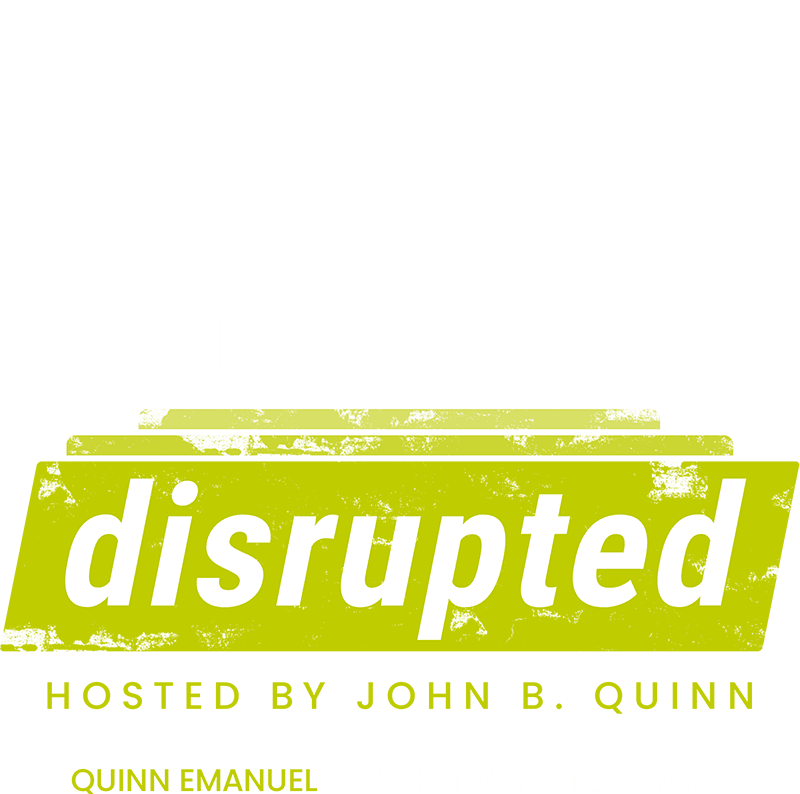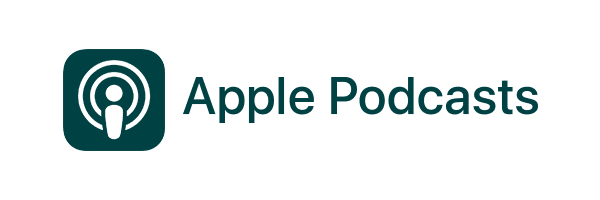Episode transcript:
Note: This transcript is generated from a recorded conversation and may contain errors or omissions. It has been edited for clarity but may not fully capture the original intent or context. For accurate interpretation, please refer to the original audio.
JOHN QUINN: This is John Quinn and this is Law disrupted. Today we’re talking about Professor Mark Wu, who’s the Henry L. Stimson professor of Law at the Harvard Law School at Harvard University. Professor Wu is an expert in international trade and international economic law. That’s his area of focus at the Harvard Law School.
And we were talking a little bit just before we started this, Mark and I said that you must, your advice, you must be really be in demand these days with all the questions out there about tariffs and what’s going on in the world and the changes in trade rules and the like on a daily basis?
MARK WU: In some ways, yes. And in some ways, no. Obviously what we’re seeing here is unprecedented and so a lot of people are curious about where we are headed, and what’s to come and how are the courts gonna rule on all the impending cases, challenging the administrations tariff actions. But I also said no, because compared to eight years ago when this was really such a shock to the system here the President signaled during the campaign he was going to do this. I think firms are much more prepared for all this, certainly foreign governments have been preparing for this type of action. So in that sense, I think it was less unexpected than it was eight years ago.
JOHN QUINN: It’s certainly in the news, I mean, every single day, and there’ve been so many changes and restarts. It really seems now though, it’s, we’ve finally come to a head, and so maybe we could step back for a moment and give us your view about what you think President Trump’s overall strategy has been, what his vision has been with respect to tariffs. Where’s he coming from?
MARK WU: So, President Trump, if you look what he’s been saying over time, has been quite consistent in his messaging. He thinks that the global trade regime that we’ve had pretty much since the 1970s onwards, has not worked in the U.S.’ favor, and so while many people, and I expect many of your listeners right, are fans of the rules based international trading system as it’s commonly referred to, because it offers predictability, it offers a way to resolve trade disputes through adjudication as opposed through force.
President Trump thinks that the rules which the United States obviously pushed for, have been abused against the U.S. and U.S. interests, and he thinks that the institutions which were set up to address those, have not responded adequately. And that has come at the expense of the United States, and in particular, his political constituency.
So he’s been hell bent on disrupting that. He thinks that the United States has the leverage and the markets and the other security umbrellas and so forth, to push our trading partners to open up their markets much more to the United States to invest much more in the United States. And he also thinks that he can change the terms of trade to push our businesses, which have been focused on efficiency and offshoring technology as well as jobs in production overseas.
He thinks that that can be reversed. So, that’s been his strategy. He campaigned very explicitly on doing so, and he tried to do this in the first term, and I think in his first term, he learned some lessons that what he was doing then wasn’t aggressive enough to turn things around.
So he’s very much determined to take more aggressive actions to accomplish, this reversal, and this disruption of the regime as we know.
JOHN QUINN: Well, I mean, to go back to first legal principles here, what is the legal authority that he relies on in which to take these, all these tariff factions?
MARK WU: So, there are a number of different, ways in which the President can raise tariffs. So just taking a step back, right, if we look at our constitution, it actually gives Congress the power to regulate foreign commerce, right? And that includes imposing tariffs. So to the extent that the President is taking this type of action, it’s because Congress has delegated this authority to the President in statutes, in legislation. Exactly, exactly. So there are a couple of those, which are right, sort of specific tariff actions. And this is what he relied upon in his first term. What’s Section 230 term with respect to national security, which is what he used for steel and aluminum. Section 301, which he used against tariffs from China and so forth.
There’s also Section 201 on safeguards. There’s section 122 for balance of payment. So these have been really sort of specific delegated, statutes. The statutes that specifically delegate right this authority to the executive branch. But in addition to this, there is also authority delegated to the executive branch, during times of national emergencies.
And so that falls under a different statute which is known as IEEPA or, what’s referred to as the International Emergency Economic Powers Act. And this so, that does provide language that allows the President to regulate importation in times of national emergencies. And Congress enacted IEEPA as a response to the trading with the Enemies Act which the President sought to do this and so forth.
And so there are a number of legal questions as to what does it exactly mean to regulate imports under IEEPA, but what the President is relying upon this time around is IEEPA to take his actions.
JOHN QUINN: Well, I mean, so has he declared a national emergency, and what is the nature of the emergency that, that he’s identified?
MARK WU: He has, he’s declared several different emergencies and to be frank here, right, so have his predecessors. His predecessors have also declared, emergency. So IEEPA has been regularly used by Presidents. But what is novel here is he’s then enacted tariffs in response to those emergencies. And so that’s what’s new here.
But the specific emergencies that he’s declared, he declared one with regards to fentanyl and the opioid crisis. And he enacted tariffs against Mexico, Canada and China in response to that national emergency. He’s also declared a national emergency with regards to our balance of payments deficit, and specifically, the persistent sort of what he terms the persistent trade deficit in goods.
And he’s found that has constituted an extraordinary threat to the natural security in the economy of the United States because it’s led to a hollowing out of the domestic manufacturing base. It’s led to critical supply chains being vulnerable. It’s led to the defense industrial base, not necessarily being quite prepared.
So those have been the national emergencies that he’s declared. And just to, you know, just to highlight, right, national emergencies have been declared in the past with regards to the Iranian hostage crisis with regards to cybersecurity threats and so forth. So there have been right, sort of these broad reaching, as well as country specific and national emergencies. But what’s unique here is then the use of tariffs to address this emergency.
JOHN QUINN: Yeah. And this is a different, seems to be a different kind of emergency than the others that you referenced in that, the hollowing out, if you will, of the U.S. manufacturing base. That’s not just something that happens just overnight. This is something that happens if you give a credence. It’s incremental over a very long period of time. And I guess he’s saying, well, this has happened long enough and we’re at a point now that this represents an emergency, this state of affairs rather than one particular event or happening.
MARK WU: Yeah, I think this is one of the interesting legal issues that present itself in this case, right? So that IEEPA refers to an unusual, or extraordinary, national emergency, you know, and so as you pointed out, right, certainly this good trades deficit has been ongoing for some period of time.
But you know what the administration would argue, so two have been right, some of the other elements in which National Securities have been declared, right? So terrorist threats is one of those cybersecurity threats, right? Those,are also sort of these low festering ones. And their point is once it gets to a certain perhaps tipping point, right? Tipping, that’s when, it becomes emergency and some type of action is warranted. And I think the President will argue, his predecessors should have done so even right earlier, but he feels the need to do so given the state of affairs today.
JOHN QUINN: Well, there have been legal challenges, we know, to these actions and his reliance on these.
Legal authorities, what are those challenges? Who’s bringing them and what is the state of those challenges at this point in time?
MARK WU: So there have been several different ongoing legal actions. Perhaps the highest profile one is one entitled VOS Selections v Trump. This is a case where VOS Selections and four other import companies sue the administration in the U.S. Court of International Trade arguing that that President has exceeded his authority under IEEPA by imposing these tariffs on a blanket basis, without explicit congressional authorization. And, after VOS filed this case, 12 states also filed a parallel lawsuit, also at the court of International Trade.
So the Court of National Trade consolidate these cases and a three judge panel ruled that the President did not have the authority to impose these across the board tariffs under IEEPA. They issued a permanent injunction against these tariffs and that was immediately appealed by the administration to the U.S. court of appeals for the Federal Circuit, which is the court that hears appeals from CIT.
And the Federal Circuit issued a temporary stay on that injunction and they had oral arguments last month on this case, and we could touch a bit more on that in a minute. But that’s an example of one of these types of cases. I’ll give another example, right, which is the state of California also sued the President, in the district court of Northern California.
Again, challenging the President’s authority to impose sweeping tariffs under, under IEEPA. There the district court judge decided to dismiss the case on jurisdictional grounds, ruling that the court, that the suit actually should be heard, before the U.S. court of international trade, right? So, that’s another example of a type of case that was brought there.
Similarly, there was the case brought on by ranchers in Montana challenging tariffs. Again there was a request from the government that this be transferred to the Court of International trade, that was granted and so forth. So just to give you some examples of it, however, there is one case, right, that was also filed by two small businesses. It’s called Learning Resources Incorporated v Trump. And that was filed in the district court, district of Columbia. And that’s one where the district court decide to proceed as opposed to those other cases, right, which were transferred over to CIT and the district court there issued a preliminary injunction preventing the administration from collecting the IEEPA tariffs. But again, that was appealed by the administration to the DC circuit. And there again, the DC circuit granted a state. So that’s just to give you a sense of the types of legal challenges being brought. But essentially there are challenges being brought by states.
There are challenges being brought by importers, and they’re being filed also before the Court of International Trade and also before various district courts.
JOHN QUINN: I mean, this U.S. Court of International trade is not a court that we hear much about.
MARK WU: Not at all. But it is right the court, that is designated to hear cases related to trade.
So more often than not, right, these are cases about rulings, about anti-dumping tariffs or countervailing duties or about tariff classifications and so forth. But, in the first Trump administration, right, there was also a major case challenging the section 232 tariffs here. And so it is the case and the administration has argued, sorry, it’s the court and the administration has argued, right, that has jurisdiction and the expertise taking care of these types of cases. And the judges that sit on it, right, do have authority also to sit in district court cases, right? They are article, article three judges. They’re article three judges.
Yeah. Just like anyone else.
JOHN QUINN: You said that they entered in an injunction on the cases, the 12 state cases that were brought before them and the cases brought by the importers, they found that he did not have the authority. And, what was the reasoning?
MARK WU: So there are a number of different reasons provided, but, they struck down the tariffs basically because they thought that to allow.
This regime to stand as is, would essentially mean that the executive branch would have almost close to unbounded delegation to change tariffs. As needed under IEEPA and so they question whether that really was the case. They noted that even though IEEPA does provide for some tariff authority, it couldn’t be the case that the term regulate importation.It’s so unlimited, right? That to allow the president to do what he’s doing in this case, which is to impose reciprocal tariffs in order to create leverage to address the national emergencies. And so it relied on language from the house committee report accompanying IEEPA to suggest that a IEEPA has enacted, referred to more narrow powers that were subject to congressional review in times of national emergency.
And so, that’s sort of this basis by which it ruled. What’s interesting is, you know, at the time IEEPA was enacted, this was all pre-China. So at that time, the Supreme Court had not yet deemed a legislative veto to be unconstitutional.
And so, you know, certainly IEEPA allows congress to overrule the national emergency. It also requires the President to report on the national emergency every six months with congress. In a post-China world, it becomes much harder for Congress to overrule the President on the emergency. And so that’s also what I think led the U.S. off international trade, right?
To think right, if it allows this regime to stand as is, it basically right, creates a very, very high bar, albeit not insurmountable, right? For the President to tweak tariffs as needed. It thinks that IEEPA, is more constrained than, as decided by the President. Obviously the administration strongly disagrees.
Right, right. And that’s why this case was appealed. And I expect it will continue to garner a lot of attention here.
JOHN QUINN: Yeah. You said that the oral argument before the federal circuit took place last month. How, how did that oral argument go and how do you read the tea leaves?
MARK WU: So, couple things that are very interesting.
One is the federal circuit decided to hear this case en banc. And as you know, right, circuit courts don’t do that unless they think that there’s a major question that’s being presented here that’s at issue and they wanna speak on the whole so clearly here, I think the federal Circuit recognizes the importance of the question at hand.
It also probably recognizes that no matter what it rules, it will, be appealed to the Supreme Court and the Supreme Court will have to rule on these types of issues. If I look at right, sort of the questions that were posed, there’s a set of questions, right, which really challenged the government to sort of say let’s look at the way the Constitution was structured. Congress is clearly provided in Article one, with the authority to regulate foreign commerce, including right imposing duties, which would cover tariffs. And so this raises question about what’s the scope of the delegation doctrine and are there limitations?
And so, you know, I think often times we’ve seen courts avoid the non delegation doctrine issues and try to rule in other ways. But I think clearly here, the federal circuit recognizes right, there are some real questions here that are presented in IEEPA there.
JOHN QUINN: In this case, it’s really staring them in the face in a major way.
MARK WU: Exactly. I mean, it’s, you know, it’s about as clear in black and white in Article one, right? That you know, this is a congressional power. And you know, again, the statute also says regulate importation. And so, you know, what does that mean? And can congress provide in language that says regulate importation, something that essentially affords President Trump the power to do what he’s been doing over the last couple of months.
Right. That’s staring us right in the face and it has major consequences for the global economy as we’ve seen. The fact that, you know, everything the President is doing is, you know, front page news and all of our major papers and has moved stock markets and so forth. Right. So I think that’s one set of questions there. There’s another set of questions which is to say, assuming this is a lawful delegation. Then if we look at the language of the statute itself, are there limitations to that delegation and how should we think about that? What does it mean to regulate, right? So does regulate include setting tariffs?
And what’s interesting there is that language is taken directly from the predecessor statute. From IEEPA, which is the training with the Enemies Act, and there was a case heard from the court that predated the federal circuit, the Court of Customs and Patent Appeals, which looked at this question for something that President Nixon did to address balance of payments and it had set forth a ruling. This case is called Yoshida v the United States. And so Yoshida got a lot of play during the oral arguments. On the one hand, YoshidA ruled that, you know, regulate imports did include, right, the tariff authority, and it had overruled the lower court, the court of customs, but on the other hand, Yoshida also said this was lawful because this was within bounds of what was in at the time of congressionally enacted statute.
That gave the President to do so, the authority to do so. So the main difference between what was done under training within Enemy Act as opposed to this other statute were some of the procedural rules that needed to be followed there. And so, you know, you could read Yoshida one way or the other, right?
With regards to this, but I think Yoshida never went up to the Supreme Court. And so it got a lot of play there in terms of what does this mean given Yoshida. And then I think the other thing that came up was, you know, there were questions raised about the major questions, doctrine, and you know, again, a very popular doctrine in the Roberts era here.
And about, again, there are some real questions staring us in the face here, but there are novel issues because the major questions, doctrine has never been applied with regards to IEEPA or something even saying, right, executive orders taken by the executive branch itself as opposed to agency sitting under the executive branch.
So I think the Federal Circuit certainly recognized the novel issues at play here, right? Trying to make sense of these questions. But it also knows that what its ruling is likely headed up to the Supreme Court, to make some new law in this area.
JOHN QUINN: So what are the implications here, of these suits? For the President’s program, I mean, does that, does this have potentially, depending upon how the Supreme Court rules, could he be stopped dead in his tracks and his ability to, you know, advance this tariff regime?
Or does he have other avenues to accomplish the same thing?
MARK WU: I think it’s more the latter, right? So there are some real important implications here, with regards to IEEPA, how it can be used. And also as I just noted right, with regards to the non delegation doctrine, also major questions doctrine and so forth, that have implications beyond just trade.
But with regards to tariffs and trade, certainly, the President is going ahead with all these negotiations over reciprocal tariffs. They’re enacting these reciprocal tariffs this week and beyond, and foreign governments aren’t responding. We’ve seen foreign governments cut deals, including, right, these framework agreements and so forth with the administration.
And so I think there’s also just the recognition that even if the courts should overrule the administration with regards to IEEPA and deem this not permissible, nevertheless, the administration has many tools at its disposal to try to get at the same type of outcome. One of those would be to go directly back to Congress, right, and ask Congress to enact something.
With regards to specific country or specific group of countries, and you know, we saw that as I mentioned with the Yoshida case, right where there was, authority. Right now, while these cases were pending, Congress did take action. Another though is to go back to some of the tools they did in the first term, right?
They could go back to the actually explicit delegated statutes but those require investigations. They have certain procedural elements they take longer to, allow out, and they, you know, it’s administratively burdened for some, for the executive branch, but they can get to the same type of outcome.
So, I think your questions a good one, in the sense that, you know, these cases aren’t gonna stop the tariff agenda, but they are going to affect the way in which it gets enacted and perhaps the more important implications are gonna be for other areas of law outside of trade and tariffs, where they’ll draw on these types of precedence.
JOHN QUINN: I mean, if he didn’t, if it’s determined he did not have authority to impose these tariffs, is there the possibility that some foreign state or, some group in the U.S. could then challenge the deals that were struck? Saying that, you know, these were obtained based on the exercise of authority, which has now been ruled, was unlawful, that these deals should be set aside.
MARK WU: You know, there you’ve got some interesting questions, right? Because obviously the President has foreign affairs powers, under Article Two. They may make the argument right, that this is part of a broader set of foreign affairs. We’ve seen, right? Some of these touch on that, right? Where they’ve touched on, transshipment, for example, from China.
JOHN QUINN: Transshipment are buying Russian oil in the case of India.
MARK WU: Exactly right. So I think the administration will push back on that front. But also I think for some of these right, countries, what they’re really seeking is just stability and predictability, and they may see we finally got to a truce. We don’t wanna upset that.
Especially given that the President has other tools at his disposal to get at a different outcome. So if, you know, one of the training partners wanted to end the deal. They may face something worse but on the other hand, you’ve got people looking at Canada saying Canada made the deal with the Trump administration during the first term, and that’s being ripped up now.
Right. So, you know, so I think you’ve got, and more importantly than not, it’s turns a lot on domestic politics in the foreign country itself. Right? Is that a government facing election? How is the populace of responding to the deal? So lots of different possibilities here for what’s to come. And I think the important thing to note is the world of trade as we knew it, is being upended and really being transformed here.
JOHN QUINN: It sounds like no matter what happens in the U.S. Supreme Court, we’re not going back to the pre-Trump trade regime. We’ve had a fundamental change here. For better or for worse.
MARK WU: Exactly. I think we’ve had a major change here and you know, I think, we’ve also had a major wake up call in part of many of our foreign trading partners to realize, right, they need to diversify, because of the unpredictability here in the U.S. as well.
So you know, for better or for worse if President Trump’s goal was simply to disrupt, I think he’s accomplished that. If his goal was something broader, right? In terms of actually bringing back domestic manufacturing and shoring up our defense industrial banks and so forth, we’ve got a long ways to go until that’s accomplished.
But certainly the disruption part is done.
JOHN QUINN: We hear lots of different points of view about these tariffs, pro and con, its impact on inflation, its impact on whether you really can revitalize U.S. domestic manufacturer, what the outcomes of this will be. Is this something just that us consumers end up paying for?
What are the positives and the negatives at this point, I guess too soon to tell and we’ll have to know over the course of time, maybe six months or a year from now, we’ll be in a better position to judge.
MARK WU: Absolutely. And the other thing I always know is there’s not a one size fits all with regards to that question.
It really depends sector by sector. What are the choke points in that industry? You know, what’s the consumer’s price elasticity, right? With regards to various different types of goods. How robust are these supply chains? What are the types of alternatives? So really we’re still in the opening stages of drama that I expect will play out during the whole presidency here.
JOHN QUINN: I mean, we’ve seen this phenomenon where some deals have been struck with some countries and announced, and then it turns out like a day or two later, it seems like, well, wait a second, there wasn’t a meeting of the minds, I’m thinking of the Japanese in particular, but I think there was another case where right afterwards there seemed to be a misunderstanding.
MARK WU: I think that’s the case, right? The Japanese are certainly facing that and having to come back and to clarify that. We also don’t know, because many times these are agreements in principle or agreements where the legal language is not released to us to examine. And there are some right, such as the transshipment 40% tariff, where those rules are yet to be drafted.
So it’s hard for us to evaluate what the impact is gonna be without knowing exactly how those rules are gonna be structured. But we do know, right, there will be new rules of origin that will deal with these types of issues. So the one good news for trade lawyers is there’s gonna be a lot of work here, in the years ahead.
JOHN QUINN: What’s your sense of where the deal stands, with China right now? I know you also have expertise in China in particular. I mean, Trump announced a deal with China some weeks ago, but, there weren’t many details. And now there’s an acknowledgement that, there are things to be ironed out and they hope to have a deal in the very new future.
Do you have any sense about where that stands? That is potentially the most important deal of all?
MARK WU: I don’t have any inside information, but from the outside what it appears to me is right, these are sort of temporary truths, both sides escalated. And China was the one training partner that continued to sort of say like, you know, I’ll see your tariffs and I’ll up you one more.
Right? And then each side up its tariffs. And then China used what it’s had for many years this choke point over critical minerals and said, you know, if you wanna inflict pain through tariffs, I can inflict pain back at you right through this choke point, critical minerals. And both sides decided, well, whoa, this is, you know, too harmful to both of us. So I think what we have right now are sort of temporary truces that sort of brought this, the temperature down to a level that’s manageable for both sides politically. But obviously each side is debating, is it worth it to have our top leader sit down and iron out something a little bit more in detail?
Or can we just live with this? And, you know, I was just in China earlier this summer, and certainly many people there are proceeding, under the assumption, you know, there’s gonna be some level of tariff from the United States. There are certainly economic headwinds that we’re facing. You know, we’re just gonna proceed full steam ahead with this economic strategy focused on industrial policy and technology upgrading, and we’re gonna rely upon other markets.
JOHN QUINN: Yeah, I was there in January and I told you before we started, the message I was getting consistently talking to Chinese businesses and leaders was, we expect nothing from the U.S. It’s gonna be hard to do business with you. This is before Trump was even President, and he was talking about 60 plus percent tariffs, and they’re saying the world’s a big place.
We’re going to Southeast Asia, Africa, Latin America. Very ambitious and very global in their thinking.
MARK WU: Yeah. And the other thing is, as we’re seeing this week, right, they see some of these actions as being favorable to their own geopolitical interests. So certainly, you know, China and India are having a moment of raw promo that we haven’t seen.
JOHN QUINN: So that’s a remarkable thing that you would’ve thought. And that early on there were some suggestions that the EU was being driven into the arms of China. Now there’s other issues that the EU has with China that seems to have stood in the way of that, but it’s kind of surprising to me. I mean, there was potential here that this could have backfired if the rest of the world had gotten organized in some fashion and acted collectively to try to exercise leverage against the U.S.
But that really hasn’t happened.
MARK WU: Yeah. And I’m skeptical that that could happen because so many of our key trading partners are really under the American security umbrella. And that’s really a key point of leverage the United States does have. Right. Until these countries really wanna decide that they’re gonna spend domestically to re-arm themselves and rebuild their own defense industrial base.
Right. They don’t have any other options, whether it’s to rely upon the U.S. security umbrella, and that’s the debate that they’re having in Europe. Right? That’s part of the reason, right? The Europeans, ultimately they may have been tempted, right, to try to, but until they decide that they’re gonna either raise taxes even more or scale back their social welfare regimes in order to pay for greater defense spending, right.
They’re relying on the U.S. security umbrella. And with the threat from Russia right now, they’ve got no better options than to make the types of deals, even though right, what President von der Leyen agreed to has gotten a lot of blowback from some of her political constituencies.
JOHN QUINN: You know, in talking to people in other countries from time to time that the view is expressed that, well, this is just a revenue raising exercise that Trump is engaging in.
He’s just, his tariffs are a way for the U.S. to get money and, you know, help address the U.S. deficit. I mean, how significant a material are these is the money that’s being raised by these tariffs.
MARK WU: So if you look at it right there certainly are much more flowing into the Treasury from tariffs than before.
But on the other hand, I’m skeptical of that argument because if that were truly the case, there are other means by which that can be accomplished. I really go back to what I started out onset saying. There is a worldview that really dislikes the regime as it’s existed and is intending to disrupt that this is much more than simply a revenue raising exercise.
If it were just that, there’d be many other ways you could do that. Certainly, you know, also the tax cut that we saw under the Big Beautiful Bill, also suggests right that, persistent federal deficit, that’s not the main concern here.
JOHN QUINN: Right? We’ve been talking to Professor Mark Wu of Harvard Law School and we’ve been talking about the President, President Trump’s tariff regime and where it stands now in the legal challenges and where it’s likely to end up.
Thank you so much for joining us. This is John Quinn and this has been Law disrupted.
Thank you for listening to Law disrupted with me, John Quinn. If you enjoyed the show, please subscribe and leave a rating and review on your chosen podcast app to stay up to date with the latest episodes. You can sign up for email alerts at our website. Law-disrupted fm or follow me on X at JB Q Law or at Quinn Emanuel.
Thank you for tuning in.
Published: Oct 29 2025










